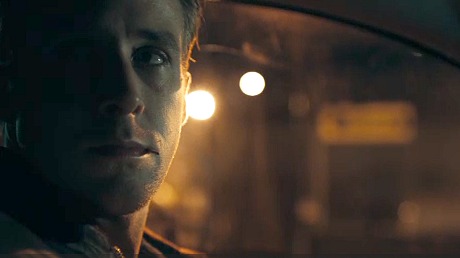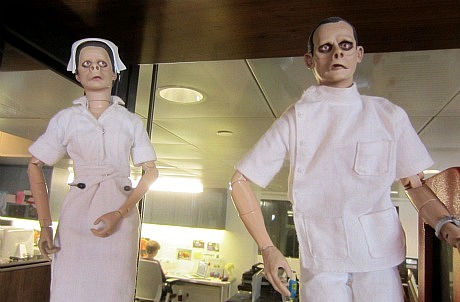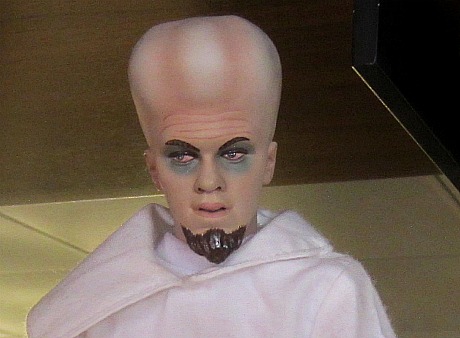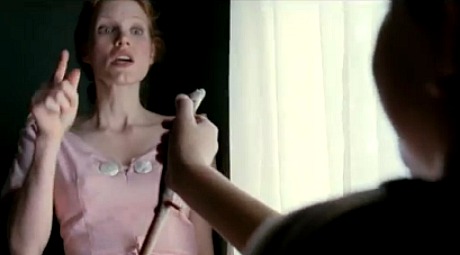Month: May 2011
Slick and Stealthy
Now this is my idea of a fast-car, supercool, Steve McQueen-y car movie. None of that idiotic Fast Five horseshit. Ryan Gosling as a stunt driver moonlighting as a getaway driver, etc. Dodge the fuzz, play it smart, keep it real. I can tell already that Justin Lin isn’t fit to shine of the boots of director Nicolas Winding Refn. Carey Mulligan, Albert Brooks, Oscar Isaacs, Bryan Cranston, Christina Hendricks and Ron Perlman costar.

Funny
Here’s the conclusion of a brief q & a between TheWrap‘s Brent Lang and Michael Moore about the killing of Osama bin Laden:
Lang: “Do you think Osama was really buried at sea because of his religious beliefs?”
Moore: “That’s bullshit — ‘He was buried at sea according to Muslim tradition.’ I’ve got many Muslim friends where I live in Michigan. When I go to a Muslim funeral in Detroit, we don’t hop in a chopper after the ceremony and drop the body into Lake Erie. We’re so worried about upsetting the Muslim world. We just shot him in the fucking head — do you think they care how we conduct the funeral?”
Murray, FDR and…Firth?
Variety‘s Diana Lodderhose is reporting that Bill Murray will play Franklin D. Roosevelt in Hyde Park on Hudson. And here’s the kicker: Richard Nelson‘s script, based on his British radio play, is about the visit of King George VI and Queen Elizabeth to President Roosevelt’s upstate New York home, called Hyde Park, in 1939. In other words, Murray is going to play host to Colin Firth and Helena Bonham-
Carter…right?


Because it won’t quite work to have someone else play the British royal couple…will it?
This is going to be a weird Murray performance. Murray doesn’t inhabit or impersonate others — he basically plays himself every time. he was great in Get Low, but he basically played Bill Murray as a small-town undertaker. FDR’s voice and speaking style are very distinct and well-known — indeed, oft-imitated. I don;t see how this is going to work.
So what happens during the visit, which occured during the summer before World War II broke out? Revelations of infidelity, that’s what. FDR’s affair with his distant cousin Daisy, that is.
Wait…what about Lucy Mercer?
Roger Michell (Notting Hill) will direct with Kevin Loader (In the Loop’) and David Aukin producing.
Doctors and Kanamits
A friend has some Twilight Zone action figures from “The Eye of the Beholder” and “To Serve Man.” Created in ’02, they’re not an ongoing product line and are therefore rare. The “Beholder” doctor and nurse are going for $225 on Amazon. The “Serve” alien (one of a race of “kanamits”) is priced in the same range.

The weird 60 degree angle of the doctor’s right arm is wrong.

The fascistic leader ranting on the flat panels during the “Beholder” finale is a vision of a right-wing tyrant. Nativist right-wingers of whatever country or culture have always been essentially about fear of other colors and creeds…the “other.” They’re also about the worshipping of authority — scratch a right-winger and you’ll always find a longing for the serenity of having a strong daddy figure — and a high-fiving of Darwinian, may-the-strongest-teeth-survive, equal-opportunity greed. The comfort, in short, of embracing your inner prick.
Spilled Red Soup
Bloody death photos of Osama bin Laden will come out sooner or later, but not officially. President Obama decided yesterday that the photos would only agitate and wouldn’t prove anything, etc. But photos of other guys killed in the compound, posted yesterday by the Guardian, offer the viewer a pretty good idea of how Osama’s corpse probably looked.

There’s no dignity in being ripped apart by bullets and then photographed in repose. No dignity at all.
Last night N.Y. Times guys Mark Landler and Mark Mazzetti reported that last Sunday’s Navy Seals’ assault upon Bin Laden’s Pakistan compound was “chaotic and bloody [but] extremely one-sided, with a force of more than 20 Navy Seal members quickly dispatching the handful of men protecting Bin Laden.”
The only shots fired by the opposition came, in fact, “when Bin Laden’s trusted courier, Abu Ahmed al-Kuwaiti, opened fire from behind the door of the guesthouse adjacent to the house where Bin Laden was hiding.”
Gently Flecked & Dusted
The professional film dweeb fraternity has been up in arms about Dan Kois‘s “Eating Your Cultural Vegetables,” which ran in last weekend’s N.Y. Times Sunday magazine. But allow me to remind that I posted a somewhat similar piece 12 years ago, called “A Little Bit Boring.” Here it is:
“Quality movies flirt with being boring from time to time. A good kind of boring, I mean. Nutritional, Brussels-sprouts, good-for-your-soul boring.
“It’s important to understand the degree of boring I’ve speaking of here. I don’t mean sinking-into-a-coma boring. Or regular boring. Or even mildly boring. But a little bit boring.
“All John Sayles movies are pretty good — some have been excellent — but they’re all a wee bit boring. David Cronenberg‘s eXistenZ was a smart, mostly cool movie, but a bit boring at times. The Red Violin is a teensy bit boring. A Midsummer Night’s Dream is slightly boring. The scent of boredom can be detected, like the aroma of wet paint, in the margins of Cookie’s Fortune. Lovers of the Arctic Circle — liked it, thought about dozing off once or twice. Bernardo Bertolucci‘s Besieged was sensual, delectable, and a bit of a nod.
“My point is, it’s often a mark of quality if something is a little bit boring. But I do mean a little bit. Too much of it and you’ll go to sleep. There are dozens of films released every year that are wonderful sleeping aids. I’m not talking about those. I’m talking about films that are laced with boredom. Like a couple pinches of salt in a bowl of egg salad. Just the right amount of it is usually an indication that a film is doing something right.
“Atom Egoyan‘s The Sweet Hereafter did a lot of things right — it was mesmerizing, quietly powerful — but it was ever so slightly boring. The English Patient was a bit boring. So were The Wings of the Dove, Seven Years in Tibet, Kundun, Washington Square. All of those fine Merchant-Ivory films, all those Jane Austen adaptations. I mean no disrespect to Carol Reed‘s The Third Man (1949) when I say, good as it is, that it’s a teensy bit boring. Same for some of the great silent classics like Way Down East, Greed and Sunrise, etc., which I respect and admire and blah-blah.
“But I’m always glad after seeing a high-quality, slightly boring film, because I can then say to myself or someone I happen to meet that I’ve just seen one, and because of this my soul is richer and my horizons have been broadened. I never feel this way after seeing a big-studio, high-velocity idiot movie. Does anyone?
“Face it — most of us are peons when it comes to upscale, slightly boring movies. We don’t want to know from complex or sophisticated. We just want to sit there and get stroked.
“This is probably our fault, to some extent. Maybe movies just seem a bit boring at times because we’ve lost the ability (or the willingness) to stay with movies that require a little patience or concentration. The cliche about today’s kids not having the attention span of a flea is reaching out to the older age brackets. Even the over-40s seem to be losing interest in movies with even a minute meditative edge. It’s not just the kids who play video games — it’s all of us.
“So clearly, in the backwash of all this cultural deprivation, ‘a little bit boring’ is a serious compliment these days. You just have to mean it (or hear it) the right way.”
Slacker
Mary Murphy‘s Hey, Boo (opening 5.13 at the Quad Cinema) is one of those gently incisive personal-portrait documentaries that covers all the bases except the one you want to know the most about. It’s about Harper Lee and the creation and lore of To Kill A Mockingbird, and is quietly absorbing and perceptive and nicely composed. But how does anyone (especially a writer) cruise for 51 years, doing essentially nothing, after writing one very moving and popular book?
Lee never wrote anything of any size or ambition after To Kill A Mockingbird. She just kicked back and chilled and lived off her Mockingbird money, which has never stopped pouring in. I’m sorry but an artist can’t do “nothing” for half a century. All artists are inclined to say more or less the same thing over and over — I get that — but a writer is about more than just saying that one thing well. Writers live to write and write to live. It’s a faith and a discipline. You don’t resign. You’re committed for life. It’s like being in the mafia.
And I’ve never been persuaded, incidentally, that Lee wrote every line of To Kill A Mockingbird all by herself. I think she had some editing help from her childhood pal Truman Capote. I don’t care what Murphy or anyone else says about this. I’ve heard things and suspect what I suspect.
And why didn’t Lee talk to Murphy for the film? Seriously — she does nothing for 50 years and then a serious filmmaker wants to compose an affectionate tribute and Lee blows her off? And yet Lee came out of hiding to accept a Presidential Medal of Freedom Award from George Bush in 2007 but reportedly declined to attend some kind of similar White House ceremony when she was invited by Barack Obama ? Is she a Republican or something? She’s a rural Alabaman so that would fit
4M Mind-Control Thriller
Nobody but nobody is going to remember the title of Sean Durkin‘s Martha Marcy May Marlene (Fox Searchlight, 10.7.11). They’re going to call it “Martha May Mary…something.” Yes, the word-of-mouth will be very good and it’ll be necessary for everyone to carefully inspect Elizabeth Olsen, younger sister of the Loathsome Twins.
But there’s still the matter of that ending, and Durkin really needs to fix it over the next two or three months. This is a movie about a malevolent cult and residual brainwashing and suppressing bad memories. It ends with the bad guys coming back into the world of the protagonist. Except, as I said during Sundance ’11, “the mildly creepy finale hints at what might be happening — maybe, sorta kinda, probably — but it leaves you up in the air and scratching your head. I walked out saying to myself, ‘Wait…what happened?'”
Playtime
EW’s “Inside Movies” columnist Adam Markovitz has posted a Fox Searchlight clip from Terrence Malick‘s The Tree of Life. It’s basically a dreamy suburban yesteryear thing with three kids chasing Jessica Chastain around with a live lizard….the spirited reveries of adolescence, etc.

The Tree of Life was seen and considered and dismissed by the distribution community last year, and it’s going to be screened all over the world concurrent with (or immediately following) the Cannes screening. So seeing it in Cannes isn’t going to feel all that special to anyone who’s flown thousands of miles to be there. I’m nonetheless ready to fall head-over-heels in love. And I can’t wait for the whispered narration passages. I’m also ready to get my hate-on. It’s up to the film. I have no dog in this.
What's So Bad About Hand-Puppeting?
I reviewed Jodie Foster‘s The Beaver on 3.16 from South by Southwest, and am re-posting a portion of the piece to synch with Friday’s opening.

“The Beaver is more of ‘heart’ thing about healing and family and forgiving,” I said. “And it uses lots and lots of closeups of Mel Gibson‘s lined and weathered face and his graying, thinning hair. What he does about 70% of the time is look forlorn and gloomy and guilty about his shortcomings. Foster is making a film, after all, about putting demons to bed and climbing out of our personal foxholes. So at the end of the day The Beaver, which is essentially a chick flick, guides Mel’s Walter character, who goes through major hell in this film, back to health and vibrancy.
“So it’s a nice soulful movie, a film that cares and gives hugs and feels sad for poor Mel during his aberration period when he goes absolutely everywhere with that brown hand puppet and acts peppy and talks like an Australian Ray Winstone. But the Beaver scenes, unhealthy as they may be for Mel’s Walter character, give the film its sass and vigor, and when the Beaver goes away near the end, the movie loses its fuel and its raison d’etre.
“As everyone knows, The Beaver is about Gibson’s Walter being depressed and on the verge of suicide, but then snapping back to life when he surrenders his identity and personality to the Beaver puppet. The Beaver takes over and Walter is alive again — his wife (Foster) falls in love with him again, his toy business becomes revitalized, he and The Beaver go on a lot of talk shows and appear on magazine covers, his younger son loves his aliveness….although his older son (Anton Yelchin) hates the whole Beaver routine and thinks his dad is an asshole.
“I took Gibson’s decision to hide behind the hand puppet as a metaphor for the way all of us hide the weaker, softer, more vulnerable aspects of our personality from society and the business world especially. Gibson isn’t ‘himself’ during his Beaver phase, but his Beaver personality is alert and creative and crackling, and he’s walking around all day with a spring in his step and paying his employees and steering a winning ship, etc. What’s so bad about that?”
Six weeks later I feel the same way. Gibson’s Beaver personality in the film isn’t relaxed or soulful or wise or warm, but he’s definitely a live-wire and in a hell of a lot better shape spiritually than the tens of millions out there who walk around like zombies at the mall and who hate or sleepwalk through their jobs and zone out in front of the tube on weeknights and weekends.
SPOILER WARNING!
So the “problem” that Gibson’s Walter character is dealing with in The Beaver isn’t that bad of a problem. It sure as hell isn’t so bad that he has to resort to a table saw to fix things.

